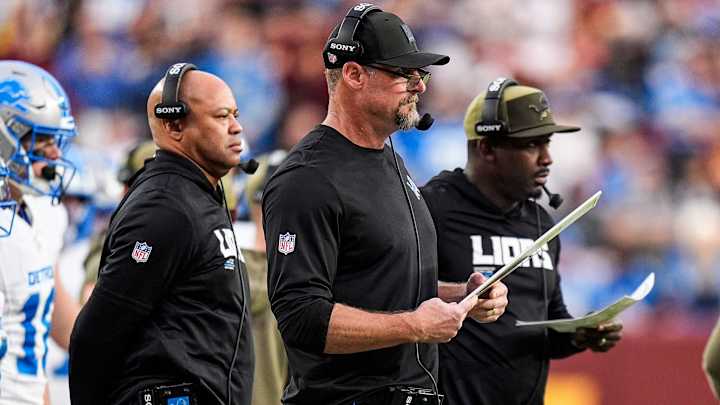Despite Detroit’s offensive explosion, the head coach admits one promising rookie was left behind in the game plan.
The Detroit Lions might have steamrolled the Washington Commanders with a 44–22 victory, but for head coach Dan Campbell, the win came with a tinge of regret. Even as the offense found its rhythm under his renewed play-calling duties, one name was noticeably absent from the fireworks — rookie wide receiver Isaac TeSlaa.
Campbell had spent the week promising to get the young receiver more involved. But when the dust settled, TeSlaa’s role was little more than a footnote in an otherwise dominant performance.
A Forgotten Promise Amid a Statement Win
Isaac TeSlaa’s rookie season was supposed to mark the beginning of something special. Drafted in the third round of the 2025 NFL Draft, he entered Detroit with high expectations and a clear path to becoming the Lions’ WR3 after the team traded veteran Tim Patrick to Jacksonville in the preseason.
Yet through ten weeks, that vision hasn’t materialized. Heading into the Washington matchup, TeSlaa had just three receptions for 54 yards and two touchdowns — numbers that hardly reflect his preseason potential. And Sunday offered no relief. The rookie recorded only one catch for 10 yards, even as the Lions’ offense erupted for over 500 total yards.
It wasn’t for lack of opportunity, at least in snaps. TeSlaa was on the field for 20 plays — his third-highest total this season — but the ball rarely came his way. For a player Campbell had publicly vowed to get more involved, the quiet outing raised eyebrows.
Campbell’s Playcalling Sparks Everyone — Except One
With Campbell calling the plays instead of offensive coordinator John Morton, Detroit’s offense came alive. Running back Jahmyr Gibbs torched Washington for 142 yards and two touchdowns on just 15 carries, while Jameson Williams enjoyed a breakout performance — hauling in six catches for 119 yards and a score.
That success, however, came at a cost. As Campbell later admitted, not every player got their moment. Though he didn’t throw anyone under the bus, the coach acknowledged his oversight.
“You always want to see everyone involved, and sometimes in a game like this, you just get caught up in what’s working,” Campbell said. “Isaac’s a guy we believe in — I’ve got to do a better job making sure he’s part of that rhythm.”
Those words echoed an honest self-assessment from a coach who prides himself on loyalty and accountability. For TeSlaa, they were also a reminder that patience might still be part of his rookie journey.
Numbers Tell the Story of Missed Chances
The disparity in usage is striking. Veteran receiver Kalif Raymond logged 38 offensive snaps — his second-highest total of the year — catching all four of his targets for 39 yards. Through ten games, Raymond has been on the field for 243 snaps, nearly double TeSlaa’s 124.
Despite his limited action, TeSlaa’s average targets per game barely move, even when he plays more:
- Fewer than 20 snaps → 0.8 average targets
- 20 or more snaps → 0.7 average targets
In short, the rookie’s playing time hasn’t translated into involvement — a troubling sign for a player once touted as Detroit’s next big vertical threat.
Finding a Role Before It’s Too Late
The Lions’ upcoming matchup with the Philadelphia Eagles presents another opportunity — and perhaps, another test — for Campbell to follow through. The Eagles’ secondary has struggled against opposing receivers this year, particularly on the perimeter, where TeSlaa’s size and physicality could be assets.
Last season, Detroit found gold when Tim Patrick emerged as a dependable WR3 down the stretch. This year, that role remains unsettled. Whether the issue lies in TeSlaa’s adjustment to the pro game or in the coaching staff’s approach, the clock is ticking.
“When you take a guy in the top 70, you expect him to be part of your offense,” a team insider noted after the game. “They’ve got to figure out what’s holding him back — and fix it fast.”
As the Lions push deeper into their playoff hunt, Campbell’s challenge will be to balance success with stewardship — ensuring no promising player, especially one with TeSlaa’s potential, gets lost in the noise of victory.
